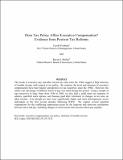Does Tax Policy Affect Executive Compensation? Evidence from Postwar Tax Reforms
Author(s)
Frydman, Carola; Molly, Raven S.
DownloadFrydman_Does Tax.pdf (279.8Kb)
OPEN_ACCESS_POLICY
Open Access Policy
Creative Commons Attribution-Noncommercial-Share Alike
Terms of use
Metadata
Show full item recordAbstract
The trends in executive pay and labor income tax rates since the 1940s suggest a high elasticity of taxable income with respect to tax policy. By contrast, the level and structure of executive compensation have been largely unresponsive to tax incentives since the 1980s. However, the relative tax advantage of different forms of pay was small during this period. Using a sample of top executives in large firms from 1946 to 2005, we also find a small short run response of salaries, qualified stock options, and bonuses paid after retirement to changes in tax rates on labor income--even though tax rates were significantly higher and more heterogeneous across individuals in the first several decades following WWII. We explore several potential explanations for the conflicting impressions given by the long-run and short-run correlations between taxes and pay, including changes in social norms and concerns about pay equality.
Description
http://www.sciencedirect.com/science/journal/aip/00472727
Date issued
2011-02Department
Sloan School of ManagementJournal
Journal of Public Economics
Publisher
Springer Science + Business Media B.V.
Citation
Frydman, Carola, and Raven S. Molloy. “Does tax policy affect executive compensation? Evidence from postwar tax reforms.” Journal of Public Economics (2011), Volume 95, Issues 11–12, December 2011, Pages 1425–1437.
Version: Author's final manuscript
ISSN
0047-2727
1879-2316